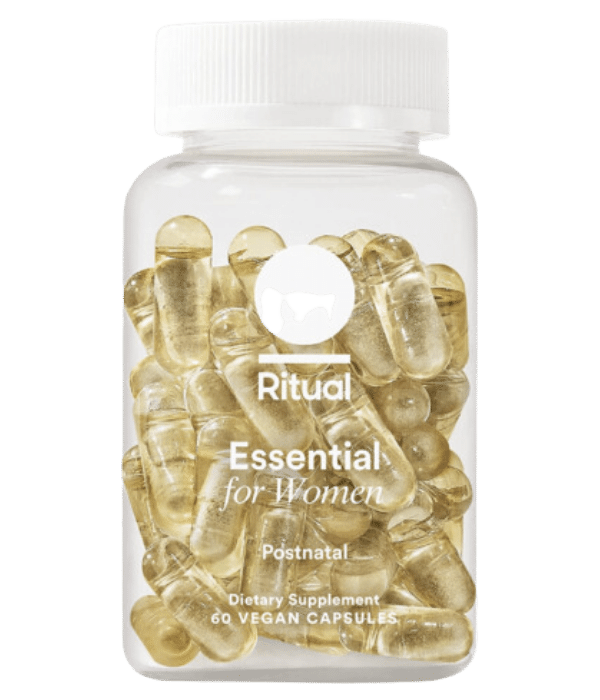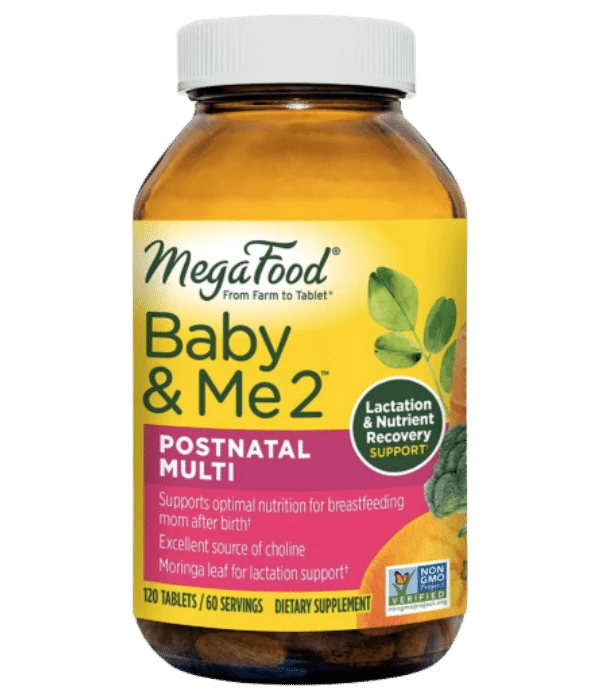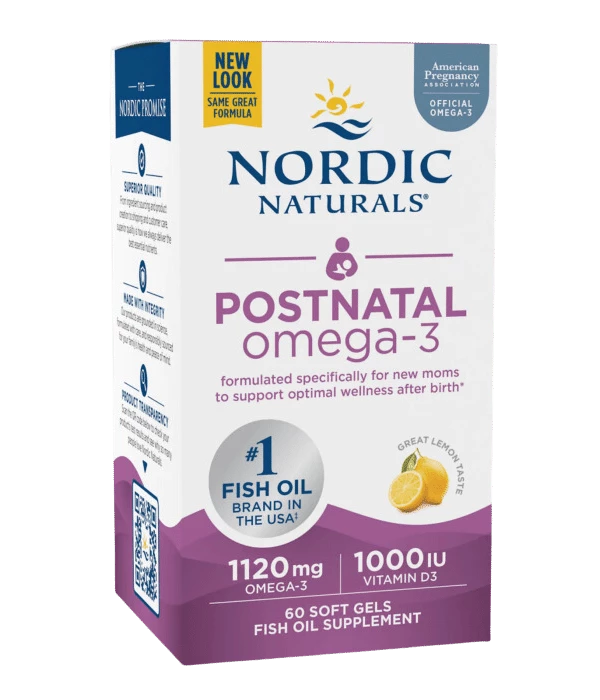Talk to a Registered Dietitian and use INSIDER20 for 20% off!
Talk to a real Dietitian for only $99: Schedule Now
This post contains links through which we may earn a small commission should you make a purchase from a brand. This in no way affects our ability to objectively critique the products and brands we review.
Evidence Based Research To fulfill our commitment to bringing our audience accurate and insightful content, our expert writers and medical reviewers rely on carefully curated research.
Read Our Editorial Policy
After giving birth, it’s common for women to place 100% of their focus on their new baby and its needs.
But pregnancy and childbirth draw heavily on your nutrient stores to complete this miraculous process, depleting your body of many vital vitamins and minerals.
As the postpartum period is commonly called the “fourth trimester,” it’s important to remember to consume adequate nutrients to support the health and recovery of both you and your baby—whether or not you decide to breastfeed.
In this article, learn more about the six best postnatal vitamin supplements, including those for women who are breastfeeding, need extra omega-3s, are on a budget, or have postpartum hair loss or mood changes.
Best Overall | Breastfeeding Support | Omega-3 | |
|---|---|---|---|
| Product | Ritual | MegaFood | Nordic Naturals |
| Key Points | Vegan; Delayed-release capsules increase bioavailability; Contains omega-3 fats (DHA), choline, and bioavailable B-vitamins | Good for breastfeeding mothers; Contains moringa leaf to support lactation; Can take it on an empty stomach | Contains high amounts of concentrated omega-3s (EPA and DHA); Small soft gels with lemon flavor are easy to take; Good for postpartum mood and brain support |
| Cost* | $39.50 for 30 servings ($1.32 per serving) Shop Now | $55.99 for 30 servings ($1.87 per serving) Shop Now | $28.95 for 45 servings ($0.64 per serving) Shop Now |
Best for: Vegan or vegetarian postpartum women; general postpartum recovery and nutrient support.
Our best overall postpartum supplement pick is the Ritual Postnatal due to its clinically supported ingredient formulation for postnatal mothers and high transparency of sourcing and manufacturing processes.
The Ritual Postnatal vitamin contains 15 nutrients in their most bioavailable forms, including methylated folate (5-MTHF) instead of folic acid, nature-identical biotin and choline, and methylated vitamin B12.
This postpartum supplement provides 350mg of vegan omega-3 fatty acids in the form of DHA and elevated amounts of vitamin D, B12, folate, and biotin.
Compared to the Ritual Essential Prenatal, the postnatal version offers several benefits, including adding vitamin A, vitamin C, and zinc and increasing iodine levels to meet the increased needs of new mothers as well as matching the reduced iron requirements for the postnatal period.
As a bonus, Ritual provides transparent information about the sourcing of each nutrient—for example, the magnesium is a research-backed chelated form from Utah (dimagnesium malate), and the vegan DHA comes from Canadian microalgae.
Best for: Breastfeeding women who want additional lactation support; moms looking for supplements to take on an empty stomach.
The MegaFood Baby & Me 2 Postnatal Multi is beneficial for breastfeeding women, as it contains the herb moringa leaf, which is thought to support healthy lactation.
This postnatal multivitamin also provides an organic food blend of oranges, brown rice, carrot, broccoli, and cabbage to add antioxidants and additional nutrients.
While this postnatal supplement contains dozens of nutrients—including lesser-seen ones, like manganese, chromium, and lutein—it does not provide any omega-3s, so postpartum women may want to seek an additional omega-3 supplement.
Which brings us to…
Best for: Postpartum women needing an additional omega-3 supplement; good for mood support.
Although the omega-3s in the Nordic Naturals Postnatal Omega-3 supplement come exclusively from 100% wild-caught sardines and anchovies, you won’t taste it—the lemon flavor provides an elevated omega-3-taking experience without the fishy burps or aftertaste.
This omega-3 supplement is specifically formulated for postnatal women, providing 1120mg total omega-3s (456mg DHA) with 1000 IUs of vitamin D3 to support healthy cognition and mood after giving birth.
However, keep in mind that this is not a full postpartum multivitamin—it should be used as a supplement to a typical postnatal vitamin that contains the vitamins and minerals you need.
Best for: Women experiencing postpartum mood changes and need additional energy support.
The Pink Stork Postpartum Mood Support supplement provides five essential nutrients plus a blend of herbs and compounds thought to support postpartum mood and relaxation, including ashwagandha, flaxseed, chamomile, saffron, and blueberry.
The vitamin D in this supplement encourages serotonin and dopamine production, the B-vitamins support brain chemical regulation, and the DHA and omega-3-rich flaxseed reduce inflammation and help with a healthy mood.
Plus, the Pink Stork supplement contains milk thistle, which may boost breast milk production.
However, while it does contain DHA, vitamins B6, B12, D, folate, and niacin, it does not provide all of the vitamins and minerals a postpartum woman needs, such as choline, vitamin A, vitamin C, or any minerals.
Best for: Postpartum women on a budget; moms looking for one pill that meets all of their needs.
The Nature Made Postnatal Multivitamin is a great supplement for postpartum women on a budget, costing just $0.31 per serving.
This supplement contains higher amounts of vitamins A, C, D3, and E, plus all eight B-vitamins, calcium, iron, iodine, magnesium, zinc, and 200mg of DHA.
Plus, the 60-day supply and serving size of just one soft gel would be welcomed by many postpartum women.
However, this postnatal is not a vegetarian option, as it contains gelatin.
Best for: Women experiencing postpartum hair loss; postpartum women wanting to take gummy vitamins.
The Pink Stork Postpartum Hair Loss Gummies are beneficial for helping with postpartum hair loss—a very common condition that many women experience after giving birth due to hormone fluctuations.
The most common vitamins and minerals thought to support hair growth are biotin, pantothenic acid (vitamin B5), vitamin C, zinc, and folate—all of which this Pink Stork supplement contains.
Plus, the strawberry-flavored gummies are tasty to eat and can reduce the pill or supplement load that a postpartum woman needs to take.
However, these gummies do not contain all of the nutrients that postnatal women may need, such as omega-3 fats, choline, and vitamin K.
You may wonder if you can just continue taking your prenatal vitamins after you have your baby—and the answer is that it’s typically okay to do so.
However, postnatal vitamin supplements typically have altered levels of some nutrients, as postpartum women require higher doses of iodine, selenium, choline, biotin, and vitamins A, B12, C, D, and E, and lower levels of iron and folic acid (compared to pregnancy).
In addition to supplying your body with nutrients that were depleted during pregnancy and childbirth, postpartum vitamins may include higher amounts of nutrients or herbs that can support specific health needs, including:
However, if you don’t have a supplement specifically for the postpartum period, it would be better to take your prenatal vitamins than nothing at all.
Surprisingly, a woman’s needs for certain nutrients are even higher during lactation than they were during pregnancy—here are the seven most important nutrients to consider after having a baby.
Iron loss is common during childbirth—especially in cases of extreme blood loss.
This mineral is essential for the health of both mother and baby, as low iron stores or anemia can cause fatigue, altered cognitive function, and depressive symptoms in postpartum women, and poor development and growth in the infant.
However, postpartum women who have adequate iron stores will likely not need to supplement with iron unless they don’t consume iron-rich foods.
This is because the Recommended Dietary Allowance (RDA) for iron during pregnancy is 27mg per day but drops to 9mg per day during the postpartum period (due to a lack of menstrual blood loss).
Keep in mind that every postpartum woman will have her menstrual cycle return at a different time—once your period returns, ensure you are consuming enough iron (either through diet or supplements) to meet your recently increased needs.
While choline is not technically a vitamin, it’s incredibly important during both the pregnant and postpartum periods—in fact, research has shown that choline is just as vital for reducing neural tube defects in utero as folate.
Choline is vital for both fetal and infant brain development, and choline levels in breast milk are directly linked to the infant’s choline levels.
The most crucial omega-3 fatty acid for infant development is DHA—and it’s important for breastfeeding mothers to consume enough so that their breast milk transfers the healthy fat to the infant.
Studies have found that infants of mothers who have higher DHA concentrations in their breast milk have better brain and vision development compared to those with lower DHA levels.
Even in women who are not breastfeeding, DHA can help with mood support—reducing the risk of postpartum depression—and enhance mental clarity.
It’s well-known that consuming folate during pregnancy prevents neural tube defects in infants—but it’s also important to maintain adequate folate levels during the postpartum period, especially if you’re breastfeeding.
While pregnant women require 600 micrograms (mcg) of folic acid, breastfeeding and non-breastfeeding postpartum women should continue taking 500mcg and 400mcg of folic acid, respectively.
Folic acid is required for DNA synthesis, making it essential for infants to consume—whether through breastmilk (which depends on the folate status of the mother) or formulas, which are fortified with folic acid.
The mineral iodine is important for postpartum women to consume because it is a vital component of thyroid hormones, which we need for healthy metabolism, growth, and development during all life stages.
Iodine needs are greater during the breastfeeding period than during pregnancy, as the mineral is absolutely essential for healthy infant growth and neurological development.
For the postpartum mom, who may or may not be breastfeeding, iodine is linked to a reduced risk of postpartum hyperthyroidism or other forms of thyroid dysfunction.
Vitamin D supports both mother and baby’s immune system, brain, and nervous system, and healthy vitamin D intake is linked to a reduced risk of postpartum mood disorders like depression and anxiety.
Most people do not consume enough vitamin D through the diet, and unless it’s possible to spend time in the sunshine daily, supplemental vitamin D is warranted in the majority of postpartum women.
Breastfeeding women may require much higher doses of vitamin D than currently recommended by the National Institutes of Health (which is set at 600 IU) to pass along the vitamin in their breast milk.
This is because research has found that 4,000 IU per day of supplemental vitamin D is needed to maintain optimal vitamin D levels in both the mother and baby.
Vitamin B12 is vital for proper red blood cell development, forming DNA, and producing energy.
Therefore, infants with low vitamin B12 levels can have inadequate growth and development, failure to thrive, or developmental delays.
Women who eat animal products tend to have adequate vitamin B12 intake, but vegans or vegetarians will need to supplement with the vitamin.
In the postpartum period, it’s best to take supplements that contain vitamins A, B12, C, D, and E, choline, iodine, biotin, omega-3 fats, and lower levels of iron and folic acid (compared to pregnancy).
It’s recommended to take postnatal vitamins immediately after giving birth to support the nutrient needs of the postpartum woman and her newborn (if she is breastfeeding).
It’s best to take prenatal vitamins during pre-conception and pregnancy, while postnatal vitamins have altered nutrient levels that are specific to the postnatal period.
However, it would be better to take prenatal vitamins than none at all during the postpartum period.
While the postnatal period is typically defined as six weeks after giving birth, many professionals take into account the “delayed postpartum period,” which typicalls last up to six months but can vary depending on hormones and breastfeeding length.
Amini S, Jafarirad S, Amani R. Postpartum depression and vitamin D: A systematic review. Crit Rev Food Sci Nutr. 2019;59(9):1514-1520. doi:10.1080/10408398.2017.1423276
Andersson M, Braegger CP. The Role of Iodine for Thyroid Function in Lactating Women and Infants. Endocr Rev. 2022;43(3):469-506. doi:10.1210/endrev/bnab029
DePender S, Russell MM, DeJager J, Comstock SS. Impact of Maternal Vitamin D Supplementation during Breastfeeding on Infant Serum Vitamin D Levels: A Narrative Review of the Recent Evidence. Children (Basel). 2022;9(12):1863. Published 2022 Nov 30. doi:10.3390/children9121863
Harding KB, Peña-Rosas JP, Webster AC, et al. Iodine supplementation for women during the preconception, pregnancy and postpartum period. Cochrane Database Syst Rev. 2017;3(3):CD011761. Published 2017 Mar 5. doi:10.1002/14651858.CD011761.pub2
Innis SM. Fatty acids and early human development. Early Hum Dev. 2007;83(12):761-766. doi:10.1016/j.earlhumdev.2007.09.004
Shaw GM, Finnell RH, Blom HJ, et al. Choline and risk of neural tube defects in a folate-fortified population. Epidemiology. 2009;20(5):714-719. doi:10.1097/EDE.0b013e3181ac9fe7